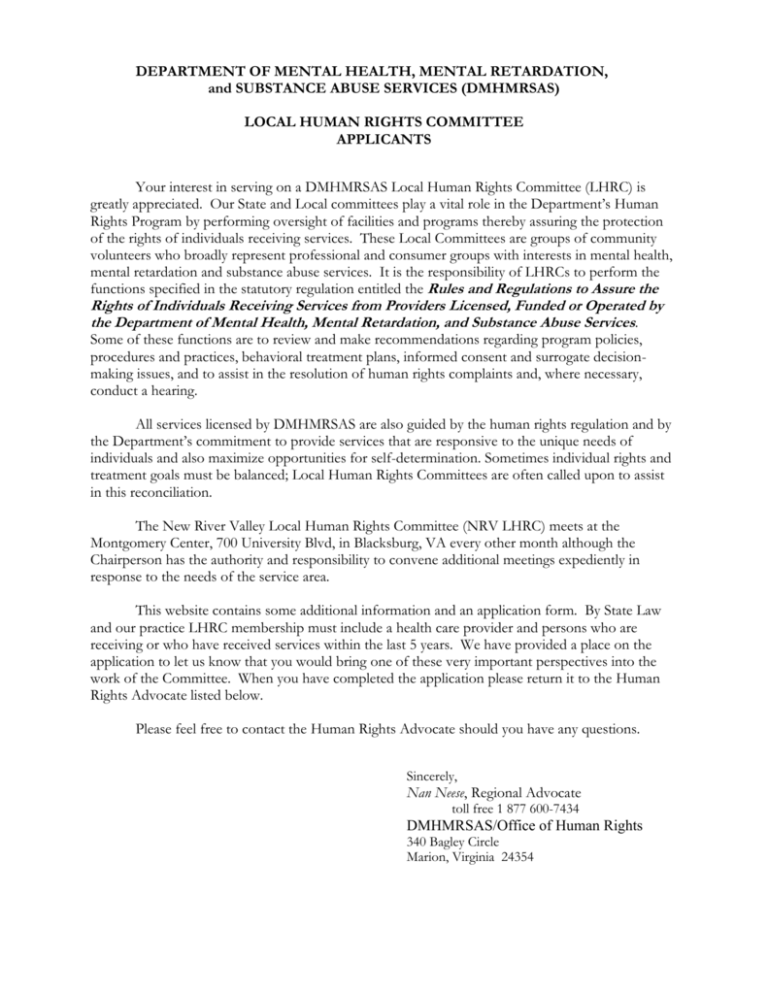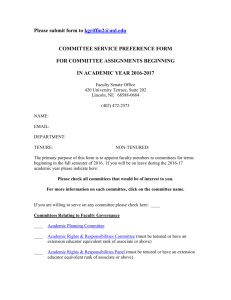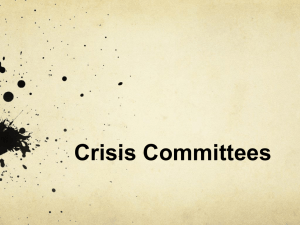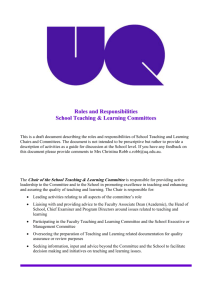department of mental health, mental retardation
advertisement

DEPARTMENT OF MENTAL HEALTH, MENTAL RETARDATION, and SUBSTANCE ABUSE SERVICES (DMHMRSAS) LOCAL HUMAN RIGHTS COMMITTEE APPLICANTS Your interest in serving on a DMHMRSAS Local Human Rights Committee (LHRC) is greatly appreciated. Our State and Local committees play a vital role in the Department’s Human Rights Program by performing oversight of facilities and programs thereby assuring the protection of the rights of individuals receiving services. These Local Committees are groups of community volunteers who broadly represent professional and consumer groups with interests in mental health, mental retardation and substance abuse services. It is the responsibility of LHRCs to perform the functions specified in the statutory regulation entitled the Rules and Regulations to Assure the Rights of Individuals Receiving Services from Providers Licensed, Funded or Operated by the Department of Mental Health, Mental Retardation, and Substance Abuse Services. Some of these functions are to review and make recommendations regarding program policies, procedures and practices, behavioral treatment plans, informed consent and surrogate decisionmaking issues, and to assist in the resolution of human rights complaints and, where necessary, conduct a hearing. All services licensed by DMHMRSAS are also guided by the human rights regulation and by the Department’s commitment to provide services that are responsive to the unique needs of individuals and also maximize opportunities for self-determination. Sometimes individual rights and treatment goals must be balanced; Local Human Rights Committees are often called upon to assist in this reconciliation. The New River Valley Local Human Rights Committee (NRV LHRC) meets at the Montgomery Center, 700 University Blvd, in Blacksburg, VA every other month although the Chairperson has the authority and responsibility to convene additional meetings expediently in response to the needs of the service area. This website contains some additional information and an application form. By State Law and our practice LHRC membership must include a health care provider and persons who are receiving or who have received services within the last 5 years. We have provided a place on the application to let us know that you would bring one of these very important perspectives into the work of the Committee. When you have completed the application please return it to the Human Rights Advocate listed below. Please feel free to contact the Human Rights Advocate should you have any questions. Sincerely, Nan Neese, Regional Advocate toll free 1 877 600-7434 DMHMRSAS/Office of Human Rights 340 Bagley Circle Marion, Virginia 24354 INFORMATION ABOUT THE LHRC Again, your commitment to serving on a DMHMRSAS Local Human Rights Committee (LHRC) is greatly appreciated. These Committees play a vital role in the Department’s Human Rights Program by providing independent oversight throughout our state facilities and other public and private organizations. Specific duties are outlined below and will be explained during orientation. Departmental Facilities and Licensed Organizations are guided by Rules and Regulations to Assure the Rights of Individuals Receiving Services from Providers Licensed, Funded or Operated by the Department of Mental Health, Mental Retardation and Substance Abuse Services and by the Department’s commitment to provide services that are responsive to the unique needs of individual clients and that maximize opportunities for self-determination and recovery. Nevertheless, these goals must frequently be reconciled with the need to protect the rights of others, the provision of therapeutic treatment, and the need to minimize the economic burden of service provision on the Commonwealth. Local Human Rights Committees are often called upon to assist in this reconciliation. Upon notice that you have submitted application, the Committee to which you have made application will invite to visit a meeting and participate in an interview. The following is provided for your information: The Local Human Rights Committee: Is a committee of community volunteers who are broadly representative of various professional and consumer groups; Performs certain oversight functions as specified in the Rules and Regulations; and Is appointed by the State Human Rights Committee. Functions of the Local Human Rights Committee: Conduct fact finding hearings and make recommendations for resolution of complaints not resolved informally; Review and make recommendations concerning program requests for variances to the Human Rights Regulations; Review program policies, procedures and practices relating to client rights, and make recommendations for change; and Perform other oversight functions as specified in the Local Human Rights Committee’s bylaws. Requirements of Local Human Rights Committee Members: Willingness to work within the parameters of the Department’s human rights process in order to resolve complaints and to facilitate improvements and/or changes in the system; Annual participation in human rights training that is provided by the Department; Regular meeting attendance. All LHRCs meet at least quarterly – some meet monthly. It is essential that a quorum be present; and Strict observance of client confidentiality. Composition: It is important that membership of Local Human Rights Committees broadly represents professionals, consumer groups, family members and other interested persons in order to maintain objectivity and a balanced diversity. Therefore, in appointing members to Local Human Rights Committees, the State Human Rights Committee takes into consideration the composition of each Local Human Rights Committee, one at a time. For this reason, nominees who are well qualified may not be appointed, simply because of the existing makeup of the Committee. We strongly encourage individuals who are not appointed to consider serving on another Local Human Rights Committee or to apply for appointment at another time. NOTE: Because of the potential for conflict of interest, attorneys and others who have represented a specific client(s) in an organization for which the Local Human Rights Committee is established shall not participate in Local Human Rights Committee proceedings where that client(s) is a party to the proceeding.






